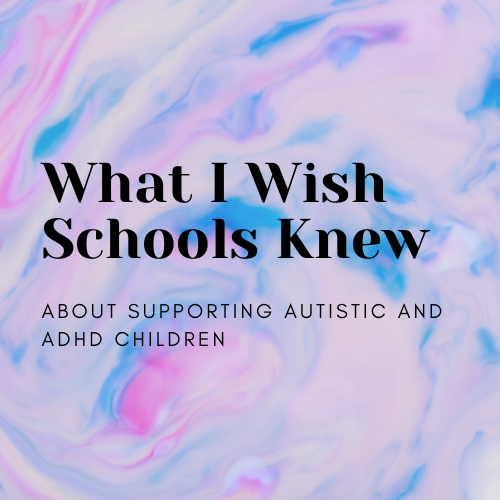What I Wish Schools Knew About Supporting Autistic and ADHD Children
Disclaimer - my school experience was varied. My experience in my earlier years was very different (not all good, not all bad) to my experience in sixth form, when I felt more understood. But this was a question I was asked, so I will try to answer based on my earlier years!
I struggled a lot at school. This started with anxiety and panic attacks when I was 13. I was eventually diagnosed with autism at the age of 16. I ran away from school, struggled to go into lessons, was described as on the verge of a school refuser and then missed a lot of school when I was unwell.
So what do I wish that teachers (who didn’t already know) had known?
I wish that teachers knew I wasn't trying to be rude when I said things bluntly or needed an answer there and then - that was how my autistic brain worked, and I didn't understand that was rude.
I wish they understood that I wasn't trying to be difficult when I couldn't engage with certain parts of the school day, like assemblies or P.E. or busy school events. I found many of these far too overwhelming.
I wish they knew that shouting and trying to scare me into conforming was never going to work. I needed gentleness and compassion. Using fear as a control tactic just increased my anxiety drastically and reduced my trust of them.
I wish they knew that sitting me next to a friend made it so much easier for me to feel less anxious and safe in lessons. When this adjustment was made, it helped me to stay in lessons.
I wish they knew that I wasn't deliberately going against the uniform policy when I wore leggings instead of tights. It was cold, but because of my sensory sensitivities I found tights incredibly itchy and they would bring my legs out in rashes.
I wish they knew that when I needed instructions clarified, it wasn't because I wasn't "using my initiative", it was because my autistic brain finds it very hard to carry out a task when I don't know exactly what I need to do and what is expected of me.
I wish they knew that I wasn't deliberately interrupting people or talking over people. And I didn't mean to keep getting distracted and talk too much. Perhaps this is ADHD, or perhaps my autistic brain not getting the social cues everyone else did.
I wish they knew that I was trying my absolute hardest in everything that I did and the school environment just didn't suit me. Forgetting homework or equipment caused me such extreme anxiety. I wish that had been understood.
Supporting neurodivergent children at school can be really hard. There are so many children in one class for a teacher to manage that it can be very hard to give individual students the support they need, especially if that student's needs are unknown. But, when my teachers got to know me and listened to me, it made my school life so much easier. When I was able to identify the places I felt safe to go to when I was struggling, instead of being told where I had to go, I was less likely to run away and felt safer in school. I spent much of sixth form hiding in a cupboard in the curriculum support block. Or in a teacher's office. There I felt safe, and I was less likely to meltdown or panic or run because I knew I could leave lessons and go there whenever I needed to. The pressure was off.
I was, in some ways, lucky. I was never painted out as a naughty or disruptive child because my perfectionism, love for learning and studiousness meant I was usually a "pleasure to have in class" (until I started to meltdown). There are so many children seen in this light. ADHD kids, especially. Many of whom are seen as naughty, disruptive or just not trying hard enough. When their body simply doesn't allow them to sit still, or their brain just cannot concentrate. It isn't their fault that the school environment just doesn't suit their brain.
Autism and ADHD are both disabilities. These children are all legally entitled to reasonable adjustments. When these are in place, it can help them to thrive. These might include:
Missing certain overwhelming lessons
Regular mentoring
Having a time out card to leave lessons
Movement breaks
Having fidget toys
Having somewhere safe to go to when needed
Specific seating plans (e.g. by a door)
Uniform adjustments due to sensory issues
Extensions on deadlines/homework
Having a reduced timetable
Allowances for forgetting things
Exam adjustments.
The school environment is a difficult one for many neurodivergent children. Understanding, compassion and adjustments can make a world of difference. I am very lucky to have had that when I most needed it, and I hope that one-day all neurodivergent children have that too.
